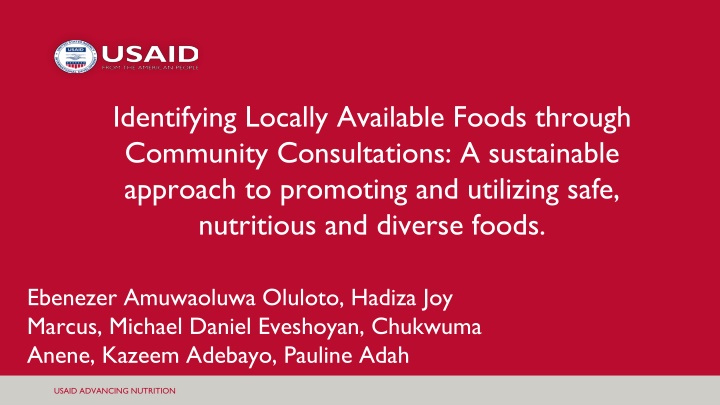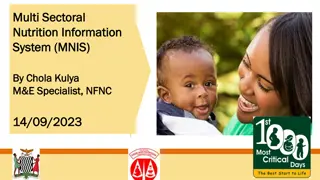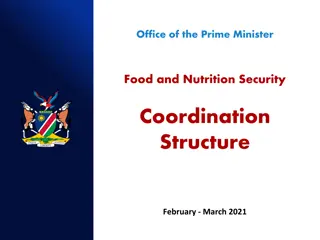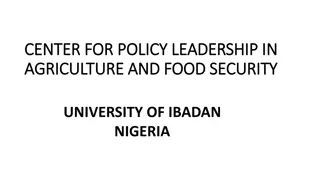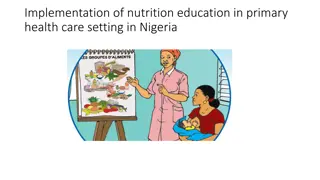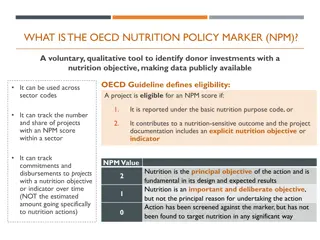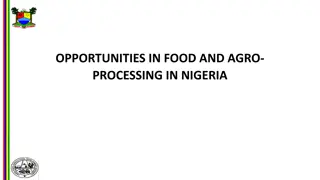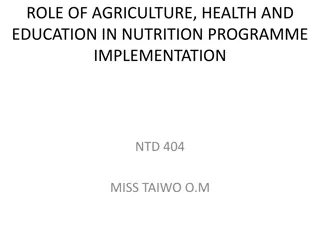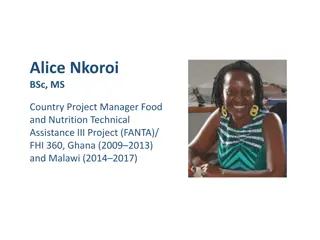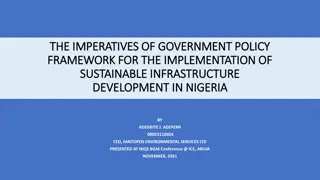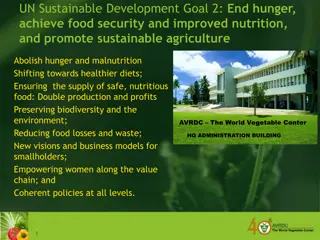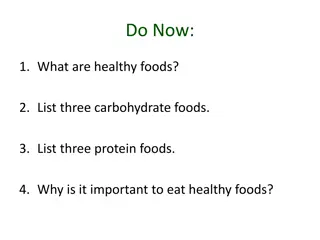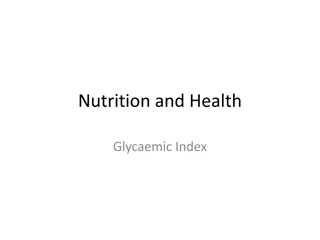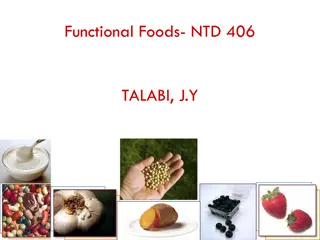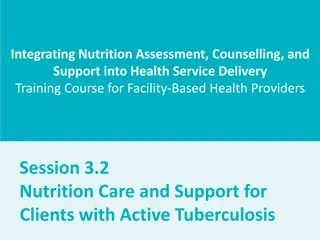Promoting Sustainable Local Foods for Nutrition Security in Nigeria
Food and nutrition insecurity in Nigeria is a pressing issue, prompting efforts to identify and promote locally available, nutritious foods. Stakeholder consultations in Sokoto, Kebbi, and Bauchi States highlighted the importance of staple crops like rice and millet, as well as bio-fortified crops. There is a focus on empowering women in agriculture and promoting crops that enhance food security and economic opportunities. Recommendations emphasize smart agriculture and land-use strategies to improve access to diverse and safe foods.
Download Presentation

Please find below an Image/Link to download the presentation.
The content on the website is provided AS IS for your information and personal use only. It may not be sold, licensed, or shared on other websites without obtaining consent from the author.If you encounter any issues during the download, it is possible that the publisher has removed the file from their server.
You are allowed to download the files provided on this website for personal or commercial use, subject to the condition that they are used lawfully. All files are the property of their respective owners.
The content on the website is provided AS IS for your information and personal use only. It may not be sold, licensed, or shared on other websites without obtaining consent from the author.
E N D
Presentation Transcript
Identifying Locally Available Foods through Community Consultations: A sustainable approach to promoting and utilizing safe, nutritious and diverse foods. Ebenezer Amuwaoluwa Oluloto, Hadiza Joy Marcus, Michael Daniel Eveshoyan, Chukwuma Anene, Kazeem Adebayo, Pauline Adah USAID ADVANCING NUTRITION
Background: Food and Nutrition insecurity has become a major challenge in Nigeria. The need to diversify access to nutritious food is crucial. Objective: To identify priority food groups or value chains and identify specific knowledge, capacity, and input gaps affecting their availability and promotion. Location: Sokoto, Kebbi and Bauchi State, Nigeria USAID ADVANCING NUTRITION
Methodology Desk review of existing literature, information and research work To gain greater understanding of state-specific context in relation to opportunities for production and consumption and improved diets. To identify pre-selected value chains To aid in the design of the consultative workshops To determine the relevant stakeholders for the consultative workshops USAID ADVANCING NUTRITION
Stakeholder Consultation Two workshops involving 170 (F:66 and M:104) value chain actors including Government of Nigeria line ministries, farmers, wholesalers, food processors, off-takers, and vendors were held. One day workshop to select priority value chains and food groups with the help of a ranking system to prioritize the food groups using predetermined criteria. One day workshop to identify motivating and mitigating factors in the promotion and acceptance of these prioritized food groups. USAID ADVANCING NUTRITION
Results Rice and millet were the highest ranked staple, though a majority of the participants were aware of other bio-fortified crops like Quality protein maize (QPM) and Orange Fleshed Sweet Potatoes (OFSP) but, they do not know how to access them. Groundnut, watermelon, spinach, moringa, goat, and poultry production were identified and advocated for by all participants as a viable pathway to improving food and nutrition security. 100% of female participants posed that ease of cultivation, maintenance, and processing are critical predetermining factors in the choice of crops cultivated by women. The stakeholders also considered crops that could increase women s income generation and economic empowerment opportunities. Due to limited opportunities for land ownership in Northern Nigeria for women, nutrient-rich crops that require small land space should be considered and smart agriculture promoted. USAID ADVANCING NUTRITION
Conclusion and Recommendation In summary, the choice and prioritized food crops were similar across the three states however, there were some peculiarities on the basis of the different agro-ecological zones and preferences across the states. Challenges identified range from insecurity in the region to low access to improved production inputs and postharvest handling practices. There is need for project to prioritize locally available foods that are acceptable by the people. USAID ADVANCING NUTRITION
Photo credit: USAIDs Nigerias MARKETS program THANK YOU USAID ADVANCING NUTRITION
